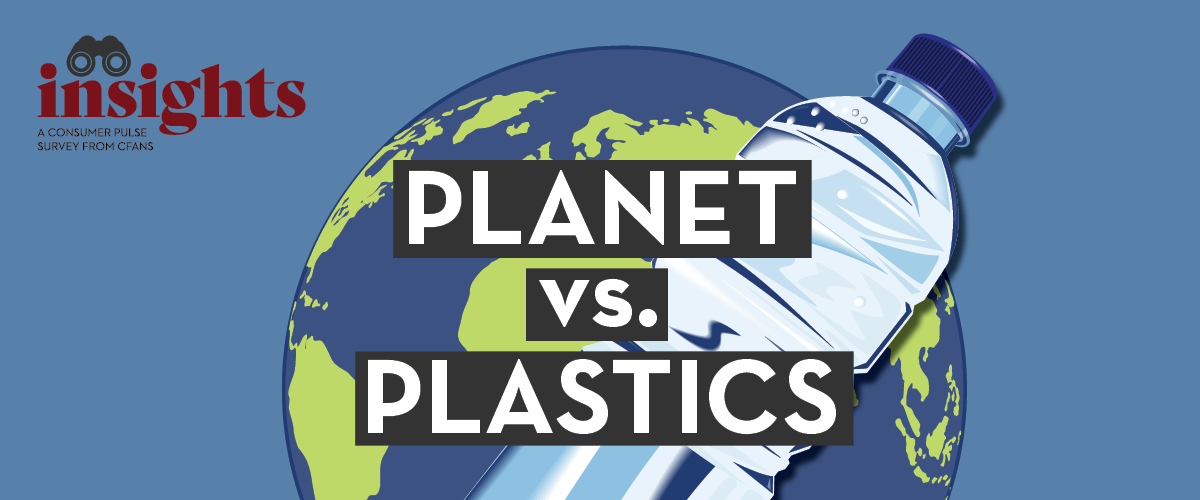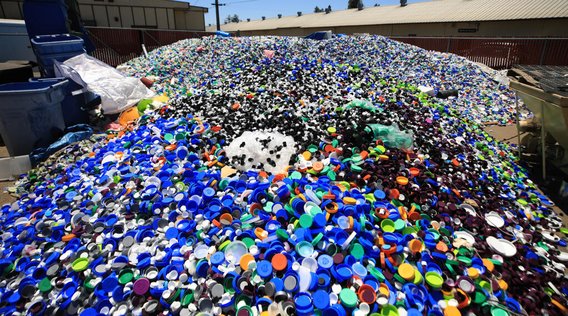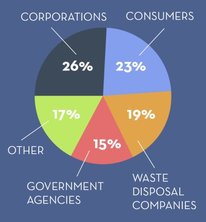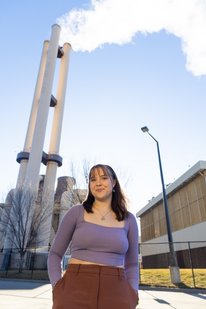
Earth Day 2024: Planet vs. Plastics
CFANS Insights Survey shows nearly 92% of Americans are concerned about microplastics’ harm to human health, lakes and wildlife

As the global population continues to grow and consumerism rises, the issue of waste management becomes increasingly critical. Around eight billion tons of plastic has been produced over the past 60 years, according to Science Advances—90.5% of which has not been recycled. As a result, this year’s Earth Day theme, “Planet vs. Plastics,” calls for a 60% reduction in plastics production by 2040.
Our CFANS Insights survey offers a view into Americans’ concerns for the impact of waste on our planet, particularly plastics; identifying barriers to recycling efforts; and collective confidence in a future where scientific innovation leads to more reusable processes.

Repurposing plastics
Plastic products are pervasive in our everyday lives. Microplastics are extremely small pieces of plastic debris in the environment resulting from the disposal and breakdown of consumer products and industrial waste. Experts inform us of the concerning impacts of plastics breaking down into our waterways, soils and food supply. In CFANS, researchers look for solutions to the grand challenges facing our planet, starting here in Minnesota—from monitoring microplastics in our natural resources to targeting plastics as a renewable resource.
When Bioproducts and Biosystems Engineering Professor and Director of Center for Biorefining Roger Ruan looks at a multicolored mountain of plastic, he sees a gold mine. He knows that the people who figure out how to efficiently turn waste plastic into new products will be the next tech moguls.

Ruan developed an innovative process for turning non-recyclable plastics into fuel—unlike any other solution that California-based Resynergi had seen, when they asked Ruan to serve as their chief technical advisor. Traditional plastic-to-fuel operations often use coal, propane or wood for heat, while Resynergi’s patented technology uses microwaves for superfast and targeted heating.
"We are committed to enhancing the value of waste materials and promoting a circular economy, to build a more sustainable future," says Ruan.
In our CFANS Insights survey, respondents show confidence in the ability of scientists to innovate and find new ways to convert waste into valuable resources: 88% of respondents are confident that scientists will find new ways to convert waste to other uses—with Gen Z and Millennials leading the way (89%).
Reducing barriers, taking responsibility
The barriers facing consumer plastics recycling are being examined, and more people are wondering: Does recycling work? When asked about perceptions of general beliefs around recycling’s effectiveness, more than one-third of respondents feel that people think recycling is unnecessary or is ineffective, as one of the biggest barriers to reducing plastic waste.
While 90% of respondents do consider the environmental impact when purchasing products with excessive packaging, a majority of respondents would not pay a premium for products that are packaged using biodegradable or recyclable materials. Gen Z and Millennial respondents were the only generations in which a majority of the demographic would pay more for products created sustainably (51% and 52%).

Who should bear the responsibility for recycling plastic waste? Results show that respondents view a fairly even distribution of responsibility between corporations, consumers, government agencies, and others.
These findings offer valuable insights into consumer preferences and motivations, informing efforts to promote sustainable packaging practices.
Minnesota impacts
CFANS researchers at the West Central Research and Outreach Center gather data from across the country to identify how Minnesota’s agricultural sector may be impacted by microplastic contamination issues and how they can be mitigated.
“Indications show that high levels of microplastics in the soil will impact the growth of some plants as smaller microplastics penetrate roots or lodge in between leaves. There is concern that high concentrations of microplastic could impact our food supply,” said Joel Tallaksen, Research Manager at the West Central Research and Outreach Center. “The key to reducing ag-related microplastics is to properly dispose of used plastics, recycle when possible, and find alternatives to plastic where available.”
Students with passion for sustainable solutions

Students looking to forge a career path solving our world’s grand sustainability challenges find their footing in CFANS.
Ava Kharin, CFANS undergraduate studying environmental sciences, policy and management, was selected as a UMN Clean Leader, participating in a year-long program offering students an opportunity to focus on a clean energy project to create change. Participating in a student-led sustainability project opened her eyes to the possibility of a future environmental policy career where she could focus on creating equitable solutions for waste diversion.
"The marriage of environmentalism and social justice are such intertwined issues,” said Kharin, who plans to attend law school as the next step in her environmental policy career.
Hope for the planet
How can you help limit the impacts of microplastics? Heidi Roop, CFANS assistant professor, Extension specialist and director of the University of Minnesota Climate Adaptation Partnership, offers solutions in The Climate Action Handbook to reduce your overall plastic consumption:
- Avoid personal care products containing microbeads (“copolymers” in the ingredients).
- Buy a fine mesh bag for washing synthetic clothing—like polyester or nylon—to trap microplastics before they enter our waterway. When purchasing clothing, look for options made from natural fabrics like cotton or wool.
As we navigate the web of environmental challenges surrounding plastic pollution and microplastics contamination, optimism persists regarding the potential for scientific innovation to create a more effective circular economy. CFANS brings innovation to the forefront of this movement through collaboration with public and private partnerships, government agencies and educating the next generation of problem-solvers, to build a world where plastic waste can become a valuable resource in the path to sustainability.
“It is vital that we all explore ways to reduce our plastic consumption. Start with an audit of plastic in your home. You might be surprised by all of the places plastics appear in your life,” says Roop.
About the CFANS Insights Survey
The CFANS Insights survey is a consumer poll that explores key perceptions and opinions about important topics in food, agriculture, and natural resources. This survey was conducted in March 2024 by ENGINE INSIGHTS, polling a demographically representative sample of approximately 1,000 adults in the United States.





